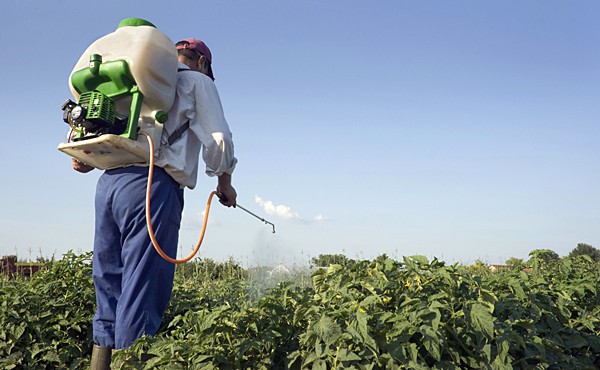Pesticides are becoming increasingly popular among growers around the world. In particular, there are thousands of different types of pesticides on sale across stores in many countries. Thus, gardeners have easy access to a wide variety of pesticides without the need for control over concentrations from authorities or professionals.
Pesticides have the effect of killing and preventing the growth of pests and insects such as mosquitoes, cockroaches, bed bugs, spiders, mice, ticks, etc. These pesticides will contain toxic compounds and kill insects when they ingest these compounds. So, in general, pesticides are not safe for human and livestock health. However, many gardeners often wonder about the safety of a pesticide once it has dried or seeped into the soil. Are pesticides safe after they dry? Let’s find out the details in the article below.
Toxic Levels Of Pesticides
In agriculture, pesticides are a group of chemicals used to kill insects, rodents, or fungal diseases in plants. In public health, pesticides are also used to repel pandemics caused by mosquitoes, cockroaches, or flies. Therefore, pesticides are dangerous products and should be used carefully in accordance with the dosage and recommendations from the manufacturer.
Currently, there are many types of pesticides available in the market. Each pesticide has its own use, composition, and standards when applied. Some previous pesticides containing the ingredients dichlorodiphenyltrichloroethane (DDT) and lindane have been banned since 2001. This is because these ingredients can linger in soil and water for more than two years. Therefore, it can seep into groundwater or affect the health of people and animals when drinking this water.
The level of toxicity of pesticides will depend on the function of each pesticide. For example, herbicides, ants, or termites will be less toxic than pesticides to kill insects or large animals such as rabbits, deer, and rats.
When humans or pets come into direct contact with pesticides through actions such as swallowing, inhalation, or contact, they will experience acute poisoning or serious health effects. All pesticides currently available will not be genetically modified and will not affect DNA. However, it can cause cancer or mutations if you are exposed to pesticides for a long time.

Are Pesticides Safe After They Dry?
Pesticides are safer if you apply them directly after they have dried or seeped into the soil. The concept of safety here refers to the degree of danger less than the actual level. Not all pesticides are safe after they have dried. Therefore, you should remember that pesticides have no concept of safety when used. Follow the instructions and recommendations from the manufacturer about the dosage, use, and medical equipment necessary to protect your health when exposed to pesticides.
Each pesticide will have a different or less dangerous level of danger after they have dried or fully adhered to the soil and plants. Pesticides for lawn care are safer for humans and animals after they have dried.
Nowadays, many gardeners regularly use pesticides for their gardens. Therefore, most people and household pets are at risk of pesticide poisoning by contacting, inhaling, or ingesting it. Pesticides used in the form of mists or sprays will easily enter the respiratory tract of humans and pets.
Therefore, when you use pesticides, you need to consider the duration and dosage for each type of plant. You should use organic pesticides derived from neem oil or products that are safe for human and animal health. If you use pesticides for a long time without knowing the dangers, you can get serious health problems.
Some Tips For Using Pesticides Safely
Pesticides will cause many serious health problems for humans and pets. When using pesticides, you need to follow the implementation rules from the manufacturer. To protect the health of you and other family members, if you must use pesticides, you should follow some of the guidelines below.
- Find out details about the pesticides you will use in your garden in liquid, tablet, or powder form.
- Information to learn such as dosage, duration of use, drug residues in nature, and duration of pesticide existence.
- Prepare a mixture of pesticides and water in the correct proportions from the manufacturer. Do not overuse concentrated insecticides because you can get poisoned by touching, inhaling, or swallowing them.
- Keep the space before and after spraying pesticides well-ventilated.
- Close the house or kitchen door to ensure that pesticides are not blown into the house.
- You should check the weather forecast before spraying pesticides to avoid high winds and heavy rain. Strong winds and heavy rain will bring pesticides everywhere, so it will affect the health of everyone around.
- You should spray pesticides in the early morning or afternoon when the temperature is cool to avoid poisoning.
- Dispose of the pesticide vial in a designated place and warn others to avoid touching it.
- Keep pesticides away from children and pets. Leave them in a designated place labeled with a hazard warning.
- If you use pesticides over a large area, contact a professional for safe handling.
- Always use gloves, a mask, and necessary medical supplies while you spray pesticides.
- When you’re done, you need to wash your hands with mouth-watering soap products to remove any pesticides from your skin or clothing.
Summary
Pesticides are a dangerous product to destroy the infestation of insects, pests, and fungi. Pesticides are not products that manufacturers recommend for regular use in your garden. You should only use pesticides when the pest or disease problem is out of control. Prioritize using organic-based pesticides such as neem oil or organic soaps to kill insects.
Toxic levels of pesticides are safer after they have dried or seeped into the soil. However, pesticides have no concept of safety for human and livestock health. Therefore, you need to consider detailed information about the dosage, duration, and frequency of application of each pesticide. When using pesticides, you always use essential tools such as gloves and masks to avoid direct contact with pesticides.